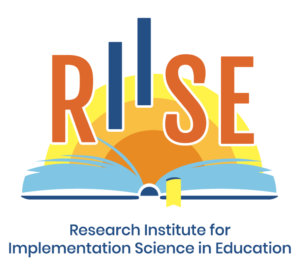
We are committed to equity, inclusion, and recruitment of diverse cohorts of RIISE Fellows. We particularly encourage applications from prospective RIISE Fellows who are members of under-represented groups in the United States with regard to gender, race/ethnicity, disability status, and other facets of human diversity. To support RIISE Fellows with disabilities, we will select an accessible training venue, provide accessible transportation, and have budgeted funds to accommodate costs associated with ensuring the accessibility.
| Applications are not currently being accepted. Check back for future application cycles. |
Who: Twelve researchers will be recruited annually for RIISE over two years 2022 – 2024). Participants will be educational researchers at any post-degree career stage from universities or other research settings with interest in conducting collaborative implementation studies across a broad range of topic areas. RIISE applicants should have:
- A graduate degree (e.g., PhD, EdD) in a field relevant to education research, broadly defined. For current students, degrees need to be completed by the time of the June Institute.
- A demonstrated record of education (or education-relevant) research.
- A strong interest in implementation research in education to support the use of evidence-based programs and practices.
- Prior experience writing a grant for external federal research funding (e.g., IES, NIH) (prior/current external funding preferred).
- An on-site mentor at their home institution who can support their progress in general grant writing and scholarly productivity (does not need to be an implementation researcher).
- An existing or emerging relationship with an educational organization interested in partnering on an implementation project.
- Interest in preparing implementation research grants for submission to federal sponsors such as IES.
Applications are encouraged across all education-relevant disciplines (e.g., special education, teacher preparation, educational leadership, educational policy, school and educational psychology), topic areas within educational research, institutions, and geography. We are strongly committed to growing the diversity of the implementation research workforce and invite applications from prospective Fellows who are from underrepresented groups or communities.
Learn about who participated in the June Institutes: 2022, 2023, 2024.
What: The RIISE Fellows will each have two years of involvement in the training program. Fellows will join the Summer Institute for two consecutive years, receive mentoring from Core Faculty, and participate in collaborative webinars with their community partners and other Fellows. All expenses will be paid except for travel. Although lodging and all meals will be provided, RIISE Fellows are expected to provide their own airfare and/or other travel expenses (e.g., Uber, public transportation, etc.). However, a Fellow’s inability to pay for airfare should never be a barrier to participation. Any accepted Fellows who are experiencing financial hardship are encouraged to submit a request to the RIISE program to cover the cost of airfare to and from Seattle.
When: There are no upcoming application cycles. The original RIISE training program grant period has concluded. Future application cycles may become available pending future IES funding. Want to stay in the know? Sign up for our listserv to receive updates.
How: Candidates will be asked to provide the following information in the application:
- A description of their career goals in the form of a research agenda and an initial concept paper for an implementation research proposal. This can be up to 3 pages total (excluding references), single-spaced and in 12-point font. Please include:
- A description of your professional trajectory and how it can align with implementation research (1-1.5 pages recommended); and
- A clear description of a potential implementation research project detailing aims, background/significance, and methods to be developed during the RIISE institute (1-1.5 pages recommended).
- Letters of support from: (a) a local mentor to assure follow-up support preparing a competitive research grant in implementation research and (b) a community education partner (e.g., a school district or regional/state education entity) who will express willingness to form a collaborative partnership with the Fellow on an implementation research project.
Letters of Support Instructions:
- Local mentor (does not need to be an implementation expert): Describe (1) the applicant’s overall research trajectory, (2) potential for impact, as well as (3) local resources and supports that can help them to advance their general research skills and to successfully submit a competitive implementation research grant proposal.
- Community partner (e.g., a school district or local/regional/state education entity): Describe your organization’s interest in forming a new collaboration or continuing an existing collaborative partnership with the applicant on an active implementation research project.
Decisions: Decisions for the RIISE Fellowship were announced March 2023.
| Questions? Contact Jodie Buntain-Ricklefs (jjbr@uw.edu). |

The research reported here was supported by the Institute of Education Sciences, U.S. Department of Education, through Grant R305B210004 to University of Washington. The opinions expressed are those of the authors and do not represent views of the Institute or the U.S. Department of Education.